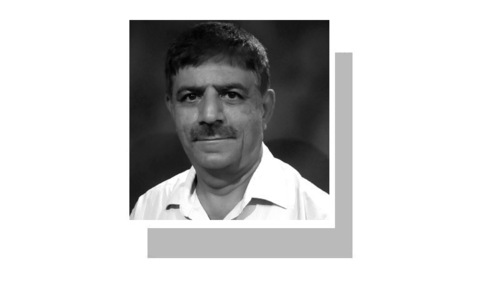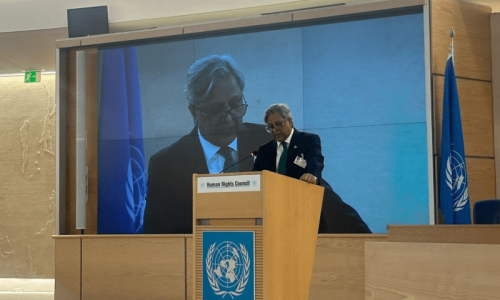ISLAMABAD: The Supreme Court on Wednesday acquitted a man who had been condemned to death in a blasphemy case in 2002 and had consequently remained behind bars for 18 years.
A three-judge bench, headed by Justice Sajjad Ali Shah, exonerated Wajih-ul-Hassan from blasphemy charges under Section 295-C (use of derogatory remarks, etc., in respect of the Holy Prophet [Peace Be Upon Him]) of the Pakistan Penal Code (PPC) for want of concrete evidence against him.
The court observed that the prosecution had failed to prove beyond reasonable doubt that the letters, which became the basis of blasphemy allegations against Mr Hassan, were actually written by him, and consequently rejected the case.
Additional Prosecutor General (APG) of Punjab Mohammad Amjad Rafiq pleaded the case against Mr Hassan through a video link from Lahore.
Elaborating, the APG told Dawn that the allegations stemmed from the letters the accused had allegedly written to a senior lawyer namely Ismail Qureshi after the latter succeeded in getting a favourable judgement from the Federal Shariat Court (FSC).
The lawyer had sought amendments to the PPC by raising the plea that the government should be directed to delete the sentence of life imprisonment from the law and instead maintain the death penalty as the only punishment for committing the grave offence.
Consequently, the FSC in 1991 ordered the government to bring amendments to the law by April 30, 1991, otherwise it would be deemed to have been amended by proposing only capital punishment for committing blasphemy.
The APG said that the accused had written five letters to Advocate Qureshi in 1998 while using the name of Hassan Murshid Masih. “The first letter was burnt by the lawyer for being too sacrilegious, but he received a series of letters.
“Later Mr Qureshi received another letter from Umar Nawaz Butt who told the lawyer that he knew the writer who had allegedly committed blasphemy, and revealed his real name with his mailing address and a copy of his national identity card. Mr Butt also said he had dispatched copies of the letter to the then prime minister and the then chief minister of Punjab.
“Mr Qureshi approached Iqbal Town police station of Lahore’s Moon Market area to lodge an FIR against Mr Hassan. Initially the police showed reluctance by saying they would seek the opinion of the Ulema Board whether these letters fell under the purview of blasphemy or not.”
According to the lawyer, finally the police registered the case against Mr Hassan under Section 295-C of the PPC, on the charge of committing blasphemy, on March 31, 1999 when Advocate Qureshi filed a petition in the Lahore High Court (LHC). The police then raided the residence of the accused in Kot Abdul Malik, Sheikhupura district.
“On May 21, 2001, the accused confessed before Mohammad Waseem, the manager of a steel/iron factory where he worked, of having committed the crime,” the AGP said. Waseem and his friend Mohammad Naveed got Mr Hassan’s ‘extrajudicial confession’ on a paper and took him to the police station where he was arrested.
On May 28, 2001, a handwriting expert, after examining handwriting specimen of the accused, said in his report that the writing of the accused closely matched with the letters in question.
Accordingly, an additional district and sessions judge of Lahore convicted Mr Hassan and awarded him death sentence. The decision was later maintained by the Lahore High Court.
However, the Supreme Court has acquitted Mr Hassan on the grounds that the ‘extra-judicial confession’ and corroboratory evidence — the handwriting expert’s report — were always considered weak evidence under the law and since there were no direct witness therefore the apex court had no option but to order release of the accused after exonerating him from all charges.
Currently, the accused is imprisoned in Kot Lakhpath Jail, Lahore, since the trial court had sentenced him to death under Section 295-C of the PPC and 10-year jail term under Section 295-A of the PPC.
While deciding the case of Aasia Bibi — a Christian lady facing death sentence on blasphemy charges — the apex court on Oct 31, 2018, had held that it was not for individuals or a gathering (mob) to decide whether any act falling within the purview of Section 295-C had been committed or not because it was the court’s mandate to make such decisions after conducting a fully qualified trial on the basis of credible evidence.
“Presumption of innocence remains throughout the case until such time the prosecution on the evidence satisfies the court beyond reasonable doubt that the accused is guilty of the offence alleged against him, the judgement says.
“There cannot be a fair trial, which is itself the primary purpose of criminal jurisprudence, if the judges have not been able to clearly elucidate the rudimentary concept of the standard of proof that prosecution must meet in order to obtain a conviction,” the judgment says.
Published in Dawn, September 26th, 2019
















































